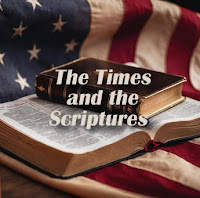by Norman D. Fox -
God has designed three forms of government
through which His delegated authority can legitimately flow for the orderly
management of human affairs.
- FAMILY GOVERNMENT. Parents exercise God’s delegated authority (Eph. 6:1-4) within the institution of the family.
- CHURCH GOVERNMENT. Selected spiritual leaders exercise God’s delegated authority (Eph. 4:11-12) within the institution of the church.
- CIVIL GOVERNMENT. Political leaders exercise God’s delegated authority (Rom. 13:1-7) within the institution of nations.
These three institutions, their
responsibilities and leadership structures, are all designed by God and can
only function legitimately under His authority.
Jesus said, “All authority in heaven and
on earth has been given unto me.” His
claim was not limited to “spiritual” authority; He asserts authority over all
things. During His trial, Jesus told
Pontius Pilate, “You would have no authority over Me, unless it had been given
you from above” (Jn. 19:10-11). Isaiah
was clearly referring to something more than the “spiritual” when he wrote of
the Messiah that “the government will rest on His shoulders,” and “There will
be no end to the increase of His government,” in Isa. 9:6-7.
America’s Founding Fathers wrote in the
Declaration of Independence that their entitlement to form a new nation was
based on “the laws of Nature and of Nature’s God.” (See Essay #33, The Declaration of Independence).
There was never any question among the Founders on this point. The authority behind America’s civil
government and its laws was God’s.
Samuel Adams, after signing the Declaration, summarized as follows what
he and the other 55 signers had just done:
“We have this day restored the Sovereign to Whom all men ought to be
obedient. He reigns in heaven, and from
the rising to the setting of the sun, let His Kingdom come.”
Yet the Founders never intended civil
government to be run by the church.
God’s authority, they understood, flowed through church and civil
governments in different ways. Still,
the same God is over all. When Jesus
said, “Render unto Caesar the things that are Caesar’s, and unto God the things
that are God’s” (Matt. 22:21), He was not describing two mutually exclusive
domains. (See Essay #30, Taxation:
“Rendering Unto Caesar.”)
Caesar’s domain (civil government) is a subset of God’s domain, as we
have seen.
On the other hand, the Founders were not
fearful of allowing leaders to exercise authority in both civil and church
governments. Many early American leaders
were clergymen who simultaneously held civil government offices. The present-day doctrine of church-state
separation was unknown at that time.
(See Essays #12, Separation of
Church and State, and #21, Founders
Breached the Famous “Wall.”)
The American colonists’ objection was
specifically to the European model of civil and church power being exercised by
the same man who had not been elected to either function by the people. In the American model, the people had the
power to choose or to dismiss their civil leaders by way of election, and had a
similar power in most of the churches.
Romans 13 teaches that civil government and
its agents are servants of God, but of course a servant cannot be rebelliously
disobedient to God and still be a servant.
Like many Bible teachings, the Romans 13 passage proceeds on the premise
that God’s will is being done, at least in general terms. (See Essay # 26, Romans 13: Government as God’s
Servant.) Psalm 2 shows that God
permits heads of government to defy him, but only temporarily. (See Essay #42, Psalm 2: When Nations Defy God.) Authority at any level of government is
either delegated by God or usurped from God.
Usurpation of power occurs when any of the
three institutions of government intrudes into areas properly governed by the
others. Examples could be the church
attempting to exercise the law enforcement function of civil government, or a
state government intruding on the child-raising functions of the family or the
evangelistic mission of the church. (See
Essay #17, I Tim. 2: Prayer, Politics and Evangelism.)
Such intrusions create problems not just
because they represent power struggles among the three modes of
government. God in His wisdom has
distributed governmental duties for maximum efficiency, and when those duties
are exercised by the wrong institutions, God’s purposes simply cannot be
accomplished with full effectiveness.
Two striking examples of this are when civil government insists on being
the primary source of poverty relief (See Essay #5, Poverty) or of children’s education (See Essays #24, Normal Christian Education, and #43, The Return to Homeschooling.)
Well-informed Christians must understand the
three institutions God has designed, and their legitimate functions and
governments. We should assess the
actions of civil government by the standard of what the scriptures say about
its proper role.
For further study:
William
Federer, ed., America’s God and Country
Encyclopedia of Quotations, 1994, FAME
Publishing, Inc., 820 S. MacArthur Blvd, Suite 105-220, Coppell, TX, 75019-4214, www.amerisearch.net
Gary
DeMar, God and Government: A Biblical and Historical Study, vol. 1, (chapters
1-6), 1989, American Vision, Inc., PO Box 220, Powder Springs, GA 30127, www.americanvision.org
James
L. Adams, Yankee Doodle Went to Church: The Righteous Revolution of 1776, especially ch. 8,
1989, Fleming H. Revell publishers, Old Tappan, NJ, 07675


No comments:
Post a Comment